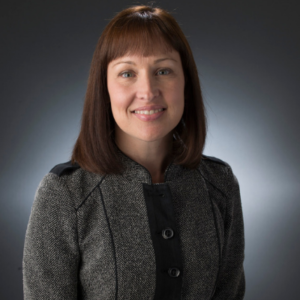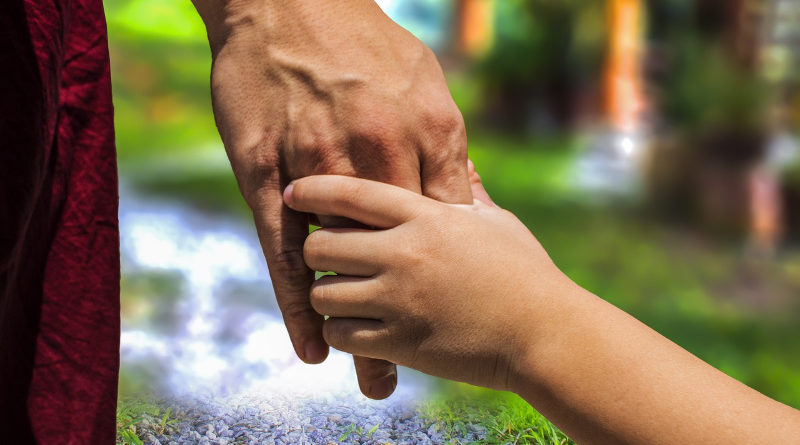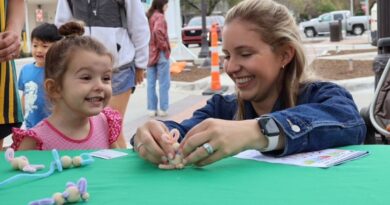Sheltered Diaries: ‘They Just Need to Know You Love Them’
It’s no secret that for most parents, this whole pandemic experience has been bittersweet. We’ve been provided the opportunity to really see what our children are learning and how their minds work – and we’ve been provided the opportunity to spend a lot (a lot) more time with them.
All of that is great. But it’s bittersweet because it’s coming at a stressful time that has us shoehorning school in with work and trying to make sure we carve out family time that isn’t about schoolwork and work.
We’ve talked about what a terrific resource the Momentous Institute is before – back when we talked about dealing with anxiety. So when the chance came for me to have a virtual chat with the nonprofit’s executive director, Jessica Trudeau, I was really excited.

Jessica has been working in public health since 2001. She now advocates for social and emotional health as a part of an organization that invests in research and training to help children and families and also provides services to Dallas families as well. Before joining Momentous Institute, she was the executive director of Family Compass, and has a master’s degree in public health from Tulane University.
If you’re unfamiliar with the Momentous Institute, it’s still possible you’re familiar with what helps support it – the Salesmanship Club of Dallas founded the organization in 1920, and it’s been going full steam ahead ever since. If the name sounds familiar, it’s because it also owns and operates its chief fundraiser, the AT&T Byron Nelson PGA tournament.
There are two locations – one in North Dallas and one in Oak Cliff – that serve Dallas families today. Oak Cliff is also home to its pre-K through fifth-grade laboratory school, the Momentous School.
So needless to say, Jessica knows well what varying stressors are hitting families right now – and she’s also in the thick of it herself, leading a nonprofit and overseeing school-at-home for her own children.
PN: First of all, what is it like keeping (like so many of us) so many balls in the air right now, when you can’t always physically see the people you need to be helping or working with?
Jessica: “I miss human presence and contact but am grateful for the availability to use video technology to be able to see one another. As Shakespeare once wrote, ‘the eyes are the window to the soul.‘ As such, when I am meeting with staff members individually or in a group via video conferencing, I can look into their eyes and observe their body language to gauge how they are doing.
Currently, I’m juggling home schooling, leading my team through this crisis, self-care, and personal balance. It’s difficult. And I think it’s important to say that out loud. I’ve spoken to many colleagues and friends who feel they should be doing a better job in various roles. But the truth is that we’re all doing the best we can, while processing loss and grief. I think we’re all learning that grief goes beyond death.
“While so many people are, in fact, grieving the loss of life, there is also collective grief for the normalcy we’ve lost, or grief of loss of a job or financial stability. I know it is important that I – and all of us – offer ourselves self-compassion and grace.”
PN: What does your typical workday look like?
Jessica: “My days are centered around ensuring our direct services are still accessible to people who need it most. And to do that, I have to focus on the team of nearly 120 educators, mental health providers and other staff at Momentous Institute. I send an email to staff each day with updates and reminders to engage in self-care. Otherwise, you will find me in back-to-back Zoom meetings most days. I really value being available for my team and all our staff. I hold two “drop in” zoom meetings per month so that any staff member can visit with me, ask questions or share concerns.
“It is very important to us that we practice what we preach.”
Our teachers and mental health providers have been asked to rapidly switch to an entirely new service delivery model. And to do this while processing their own grief, homeschooling children and caring for family members. And as such, I am committed to being as available as often as possible to hear feedback and make sure that they feel supported and cared for.
And I can only create space for others, as I am caring for my own mental wellbeing. In my personal time, you will find me riding bikes with my children, doing yoga, listening to music or reflecting on what’s happening right now and how I can learn and grow.”
PN: We hear a lot about how this isn’t working from home, or schooling from home, but it’s working and schooling from home during a crisis. But for many in this city, that crisis is significantly bigger and devastating than others – and that can really impact families and children. How do we help them?
Jessica: “Most families are experiencing loss of some sort – loss of job, financial security, or the normal cadence of life. Some families are facing far worse – hospitalization or loss of loved ones. Our educators and mental health providers are often the only adults outside of parents who children are interacting with. Their roles are critical, and we need to do everything we can to support them.
“We are all concerned about an academic gap when children return to school. And through our research, we know that educators will never achieve the academic gains that will be needed without a focus on social-emotional health.”
This is especially true for the children of families who are disproportionately impacted by the pandemic. While educators will want to go straight to academics in the fall, children will be better served by having space to process their experiences, develop safe relationships and build social-emotional health. This foundation will, in turn, allow for the necessary academic gain.
Research indicates that we can expect a community-level mental health decline in the future as this pandemic goes on. The most important thing we can do right now is ensure that children and families, especially those disproportionately affected, have access to mental health services now and in the future. This means that all mental health providers throughout our community need support to continue to be able to offer services at full capacity.
Finally, from a macro lens, the best thing that we can do for each other right now is to offer grace and compassion at every turn. People are struggling, experiencing or reliving traumatic events. We are collectively stressed and grieving. Now is the time to remember that we are going through this together and have the choice to be gentle and kind to ourselves and others.”
PN: A lot of parents at home right now are feeling overwhelmed, and you often read that kids base their reactions on the cues we give them from our own reactions. How do we help our kids – who are feeling overwhelmed with all of this change of routine – when we’re feeling the same way?
Jessica: “Our research at Momentous Institute shows that children do as well as the adults in their lives are doing. The absolute best thing that parents can do to support their children is to take care of themselves by managing their own stress and mental health. Children are looking to the adults in their lives for answers and how to react.
First, it’s OK for parents to not have all the answers. Second, what children need most is adults who can self-regulate and manage stress, so they can do the same.
“Third, they just need to know you love them. And you do.”
PN: What is the biggest piece of advice you can give parents navigating all of this?
Jessica: “Remember, NOONE is the perfect parent right now. We all must remind ourselves that we are doing the best we can. Our research at Momentous Institute tells us that parents who work toward strong social-emotional health – meaning they can manage their emotions, reactions and relationships – are showing their children how to navigate tough situations. It does not tell us that adults must be perfect for their children.
Finally, children miss normalcy. Give them space to share their frustrations.
And when we make a mistake or don’t get it right the first time, it’s never too late to go back and repair, talk things out or apologize.
PN: What is something you miss?
Jessica: “I miss human presence. The energy that enters a room when you are brainstorming, the delight of sipping tea with a friend and the moments where you laugh so hard your stomach hurts.
At the beginning, I missed other things – dinners out, movies at the theater, busyness that filled the spaces where I would overthink. But what I have found has deeply moved me – quietness to lean into discomfort, gratitude for animals that I see on my bike rides, moments of cooking and baking and fun with my children.
And, most surprisingly, a deep sense of what I have waited for all my life – self–contentment – a realization that I love the company I keep in my moments alone.”
PN: What is something that has developed out of the COVID-19 response that you hope sticks around permanently?
Jessica: “I hope to see collective compassion continue to build. I hope we remember that essential workers – nurses, doctors, grocery store clerks and others – are essential even when we’re not in a pandemic.
I hope we can cherish our new understanding of what our teachers and mental health providers do for children every day.
I hope we can remember that we have a choice and that something deep within beckons for a slower pace where we lay our devices down and relish in relationships.
Personally, I hope to keep quiet, reflective spaces where I can focus on nourishing my soul.
What are some things you miss – and some things you found you don’t miss at all? Let us know in the comments – or if you’d like to chat further, email bethany.erickson@peoplenewspapers.com.









